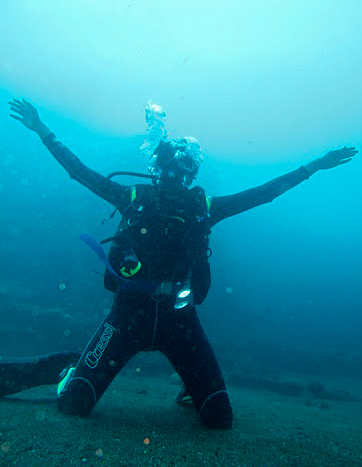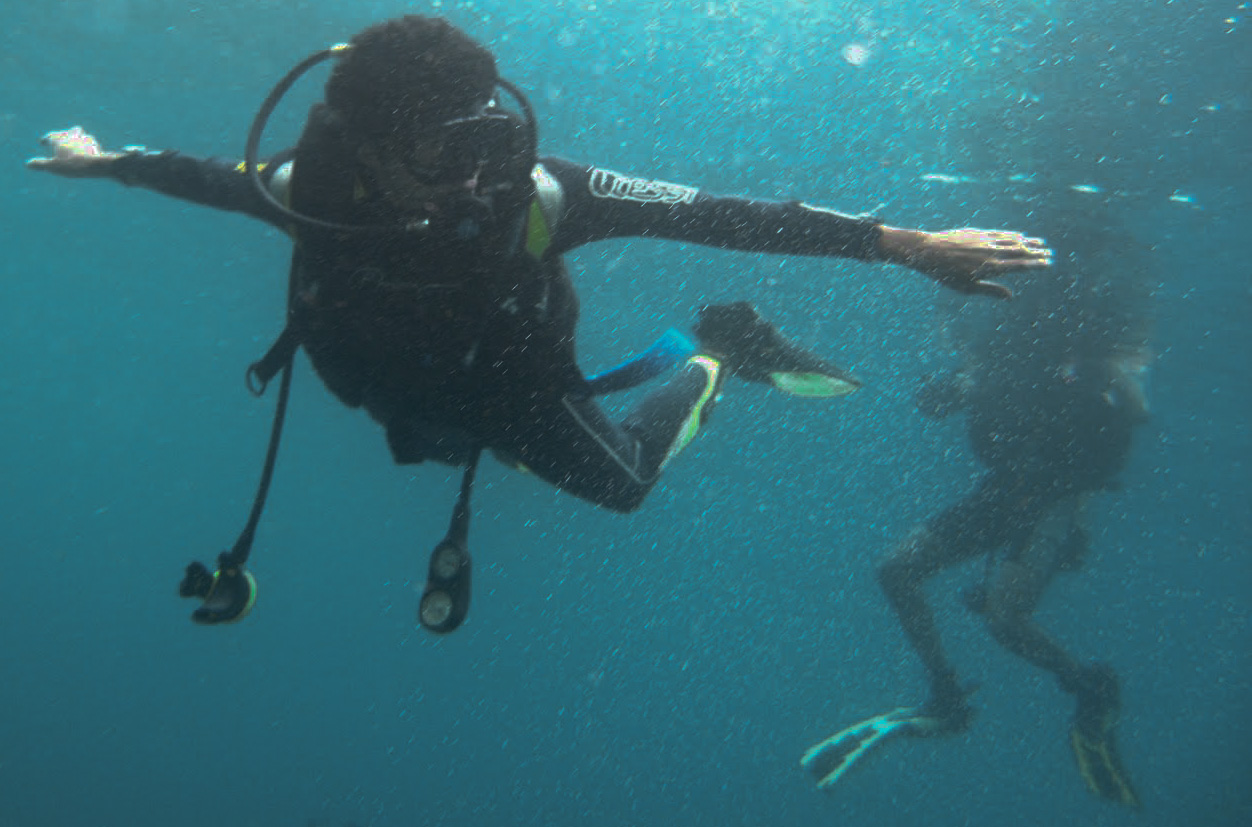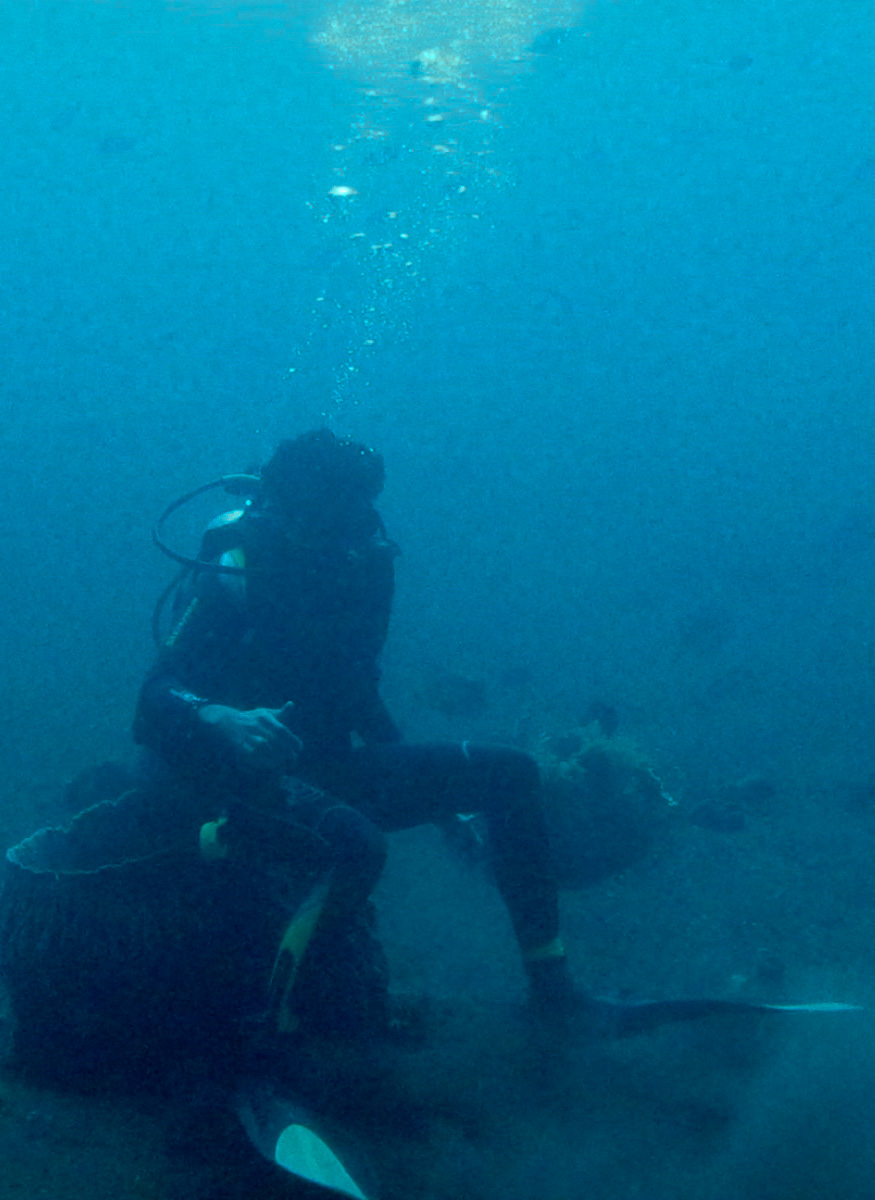Diving in Bali – Can You Get Any Wetter?
While the two others on the Bali trip (they called themselves the Dynamic Duo) were getting their basic dive certification, Brit and I decided to cheat our way to a PADI advanced certification. After copying each other’s wrong answers for our ‘theory’ component we now only had five fancy dives in two days between us and a new card to certify us as advanced divers and clinically mad.
Underwater Navigation
This was an altogether more boring dive but probably very important. Despite traversing a perfect square on a sandy patch (under water mind you) with just a compass, we still can’t navigate to save our lives literally. Oh and apparently there was a black-tipped shark in the waters while we were busy navigating. The thought of having to return to the same waters in the night later was a bit worrying.
The other highlight of this dive was the most complex conversation I’ve had under-water.
Me – Water cold here. But warm here.
Brit – Like in that episode of Planet Earth.
Me – Thermokline!
Brit – Yea .. there is a lot of marine life in thermoklines. Watch out.
Me – High five!
Just remember that this was all done through sign language coz you can’t talk under-water!
Night Dive
This was truly an unforgettable experience. I’ve never been more focused on a dive before. It was one of those things that make you go “Why am I doing this again?” We saw some interesting organisms but the real thrill came when instructor asked us to switch off our torches – I pretended to not understand. Then he did it himself. The dark swallowed us.
In this modern day, we don’t experience genuine total darkness. This was a different level. 20m underwater, the cool night sea engulfed us in a silent suffocating envelope of black interrupted only by the chortle of our bubbling breath. Then the lights came back on! The two of us were constantly checking our backs to see if that dastardly shark was anywhere. Good dive to end the day!
Wreck Dive
The next day’s programme was promising and therefore inevitably disappointing. The USAT Liberty was a world-famous wreck dive site which looked churlish and average that day. We did hit 30 m depth but a downward sea-current challenged me a great deal. I eventually made it back but in an ungainly fashion and really off-course.
Deep Dive
Our deep dive off the side of a cliff under water turned out to be a lot less dramatic than I hoped. It was a deep fall alright but when you are suspended 30 m under water, being on the side of a sheer cliff isn’t that spectacular. It would have been even less memorable had it not been for me almost starting my dive without my cylinder open. A few metres into the water lugging a heavy ass cylinder and weight-belt, I realized I had no way of inflating my suit to stay afloat. Furiously back-pedalled to shore and rectified the situation. At the end, we were certified and so were the Dynamic Duo.
21 dives into my amateur diving career and I still treat the underwater with a healthy dose of skepticism and fear. I wear gloves lest I touch something evil and obsess about my gear. I constantly check my air gauge and breathe heavy to convince myself I am not drowning. All that fussing and my high metabolism combine to rob me off at least 10 minutes of dive time – I use up the air too fast!
Interesting fact: an empty aluminium cylinder (since it is supposed to contain life-saving air, empty is not good!) is very buoyant and causes you to surface uncontrollably.
Diving is not for everyone – and probably not for me. I can say with great confidence that I am not a natural but I have persisted and progressed. I can see myself slowly accumulating dives over the coming years till the proverbial shark or decompression illness ends my run. With me, it might even be a rogue unopened cylinder valve!




Awesome picture of you holding the mud – feel quite bad about not having a camera on my previous dives. Definitely tempted to make a quick dash to some Caribbean island for my advanced certification..
Thermokline! high point of geekiness
Sounds like you haven’t had a very good level of instruction. If pre-dive buddy checks are carried out, you should never have entered the water without your air turned on.
Remember diving is a safe sport as long as you remember it is dangerous. If all the rules and safety procedures are adhered to accidents are rare.
If you are keen to continue your diving i would recommend you extend your level of training.
When i started diving i assumed that if something went wrong the dive guide would sort it out, however in reality if something goes wrong at 30 metres down you should be able to sort out yourself with the aid of your buddy if necessary. If something happens to the dive guide, would you know how to rescue them?
Advance your diving and you will enjoy it more and you will use less air meaning you have more bottom time.
never dive before.
any recommendation?
will be in bali from 26th-29th May